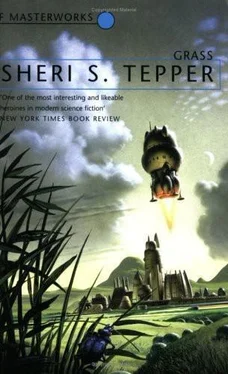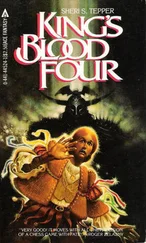Sheri Tepper - Grass
Здесь есть возможность читать онлайн «Sheri Tepper - Grass» весь текст электронной книги совершенно бесплатно (целиком полную версию без сокращений). В некоторых случаях можно слушать аудио, скачать через торрент в формате fb2 и присутствует краткое содержание. Город: London, Год выпуска: 2002, ISBN: 2002, Издательство: Gollancz, Жанр: Фантастика и фэнтези, на английском языке. Описание произведения, (предисловие) а так же отзывы посетителей доступны на портале библиотеки ЛибКат.
- Название:Grass
- Автор:
- Издательство:Gollancz
- Жанр:
- Год:2002
- Город:London
- ISBN:9781857987980
- Рейтинг книги:4 / 5. Голосов: 1
-
Избранное:Добавить в избранное
- Отзывы:
-
Ваша оценка:
- 80
- 1
- 2
- 3
- 4
- 5
Grass: краткое содержание, описание и аннотация
Предлагаем к чтению аннотацию, описание, краткое содержание или предисловие (зависит от того, что написал сам автор книги «Grass»). Если вы не нашли необходимую информацию о книге — напишите в комментариях, мы постараемся отыскать её.
Grass — читать онлайн бесплатно полную книгу (весь текст) целиком
Ниже представлен текст книги, разбитый по страницам. Система сохранения места последней прочитанной страницы, позволяет с удобством читать онлайн бесплатно книгу «Grass», без необходимости каждый раз заново искать на чём Вы остановились. Поставьте закладку, и сможете в любой момент перейти на страницу, на которой закончили чтение.
Интервал:
Закладка:
The refectory had four vaulted halls radiating like fingers from a central dome. Under the dome was the dais on which the Eldest Brothers sat: Jhamlees and Fuasoi and Laeroa, plus half a dozen others. Down the splayed halls, in long, single rows, stood the woven grass tables of the penitents, seated in order of seniority. The tables themselves were wonderful, or at least so Rillibee thought.
Strips of grass stem had been spiraled and woven into shapes representing twigs and leaves and blossoms. Tabletops curved down into serrated aprons and thence into legs bulging with rococo excess. At home, Rillibee’s mother would have called it wicker, pointing out the similarities to the old brown rocking chair beside the fire. Here it was known only as grass weaving, but the grass had dozens of hues and a hundred tints.
Lifetimes of Brothers had fondled the braided arms of these chairs, rubbed the basketry seats smooth with their bottoms, shined the convoluted edges of these tables with their bellies and sleeves. Brother Rillibee/Lourai’s place was at the far end of a row of tables so long that it dwindled almost to nothing as he looked along the tops toward the dome. It made eating a lonely business for the newest Brothers, however much it encouraged reflection.
And it made living a lonely business, too. The chairs to either side of him were empty. There was no one he could ask for help. Probably, no one who would help him if he did ask. And no time to ask, in any case, for the harsh clangor of the ending bell broke through all other sounds and stopped them. He rose to follow hundreds of other shuffling forms as they set their plates within the hatch and went out into the evening.
When he reached the open air, he turned aside from the court into an alleyway which led back beside the refectory to the washing house. There he stationed himself at one handle of the pump and waited for his coworker to arrive. This anonymous, middle-aged Brother sat down at his own handle and the two of them began the monotonous thrusting which would bring water from a hot spring far below. From the pump the water went into the hot kettles. When the kettles were full, the water went into the rinsing trough. By the time the rinsing trough was full, the kettles would be empty again.
“Damn fool thing,” muttered Brother Lourai, thinking of solar batteries and wind-driven pumps, both of which were in use elsewhere at the Friary to pump bath water and fill the fish ponds and the large tank that provided drinking water.
“Hush,” said the older man with a glare. Pumping was a penitential service. It wasn’t supposed to be easy or make sense.
Rillibee hushed. No point in wanting it over sooner. Tonight, it would be better for it to last as long as possible. He spent the time thinking about the interview he’d had with Elder Brother Jhamlees the previous day.
“It says here, boy…” the Elder Brother had announced, “it says here you flew apart in refectory and began making wild accusations.”
Rillibee had started to retort, started to say something daring and angry, then had remembered Mainoa’s advice. “Yes, Elder Brother.” he had said.
“Only had two years to go,” the Elder Brother went on. He was a man with a face like cork, evenly colored, evenly textured, as though he were wearing a mask. All his features were ordinary except his nose, so tiny a nose, like a slice off the end of a wine cork stuck on the middle of his face, the nostrils mere slits. Around that tiny nose the other features seemed disturbingly large. “Two years, and you had to go doubting. Well, we won’t have any of that here, you know that.”
“Yes, Elder Brother.”
“Let’s see what you remember of your catechism. Ah, well now, what is the purpose of mankind?”
“To populate the galaxy in God’s time.”
“Ah. Well, what is women’s duty?”
“To bear children for the population of the galaxy.”
“Ah, well, how shall this population be accomplished?”
“By the resurrection of all those who have ever lived, to the time of our first parents.”
“And how shall we be led?”
“By the resurrection of the Son of God and all the saints who shall again be saints, of the latter days, to guide us to perfect Sanctity, Unity, and Immortality.”
“Hmm,” said Elder Brother Jhamlees. “You know your doctrine well enough. What the hell happened to you?”
Mainoa’s advice forgotten, Rillibee asked, “When we all get resurrected, Elder Brother, will the machines do it?”
“What do you mean, boy!”
“There won’t be any people left. The plague will have killed us all. Will the machines do all the resurrecting?”
“That’ll be ten stripes for impertinence,” Elder Brother Jhamlees said. “And another ten for uttering falsehood. There is no plague, Brother Lourai. None.”
“I saw my mother die of it,” said Rillibee Chime. “And my father and my sister had it. I may have it. They say sometimes it doesn’t come out for years…”
“Out,” the Elder Brother had blustered. “Out. Out.” His face had turned pale as he bellowed, so pale that Brother Lourai wondered if the Elder Brother had ever met anyone who had actually seen the plague.
Brother Lourai had gone out. Ever since then, he’d been expecting someone to summon him to receive the twenty stripes Elder Brother Jhamlees had assigned him. No one had. The only summons had been the summons in refectory, the one he didn’t want to answer. The one he was delaying now, pumping water while the dishes got washed.
Still, inevitably, the task was finished at last. The kettles were emptied into a ditch that led to the cesspool, the rinsing troughs emptied into a ditch leading to the gardens, the soapy steam vanished out the open door as Brothers scattered wordlessly. Rillibee’s counterpart at the other end of the pump handle hitched up his robes and went out. After a long, silent moment, Rillibee did likewise.
He thought he might stay in the washing house and hide. He considered this for a time, quite seriously, knowing it for nonsense but unwilling to let the idea go entirely. Where would they be waiting for him? Outside the courtyard somewhere, perhaps in the alley which led to his dormitory?
“Come on,” said an impatient voice. “Get it over.” It was too much trouble to answer the voice. It would be even more trouble to avoid it. Unwillingly, he shambled toward the summoner, through the gateway from the yard, into the alley, where three of them grabbed him and forced him through a door and down a hallway into an unfamiliar room. They wore only their tights and undershirts. Their faces were lit in the lantern light with shiny and unholy glee. There was no doubt at all that these were the climbers Mainoa had told him about. Not warned him. What good was it to warn someone about the inevitable? But one could be told. One could be given time to consider. Not that it had done Rillibee any good.
They pushed him toward a bench and he sat on it to hide the trembling of his legs. It wasn’t fear. It was something else, something some of those confronting him might have understood if there had been time to talk. There was no time.
The foremost among those standing there — the group had grown to a dozen or so — struck a posture and announced, “Call me Highbones!” He was a lean, long-armed man with a taut-skinned boyish face, though the wrinkles around his eyes said he was no boy. A hank of dun hair fell over his forehead and was pushed back with a studied gesture. The color of the hair was ageless. His brows grew together over his nose. His eyes were so pale a blue as to be almost white. Everything about him was studied, his stance, his gesture, his manner, his voice. Created, made up, out of what?
Rillibee saw all this as he nodded an acknowledgment just to let them know he had heard. No point in saying anything. Least said, the easiest denied, as the master of acolytes at Sanctity had been fond of telling them.
Читать дальшеИнтервал:
Закладка:
Похожие книги на «Grass»
Представляем Вашему вниманию похожие книги на «Grass» списком для выбора. Мы отобрали схожую по названию и смыслу литературу в надежде предоставить читателям больше вариантов отыскать новые, интересные, ещё непрочитанные произведения.
Обсуждение, отзывы о книге «Grass» и просто собственные мнения читателей. Оставьте ваши комментарии, напишите, что Вы думаете о произведении, его смысле или главных героях. Укажите что конкретно понравилось, а что нет, и почему Вы так считаете.












